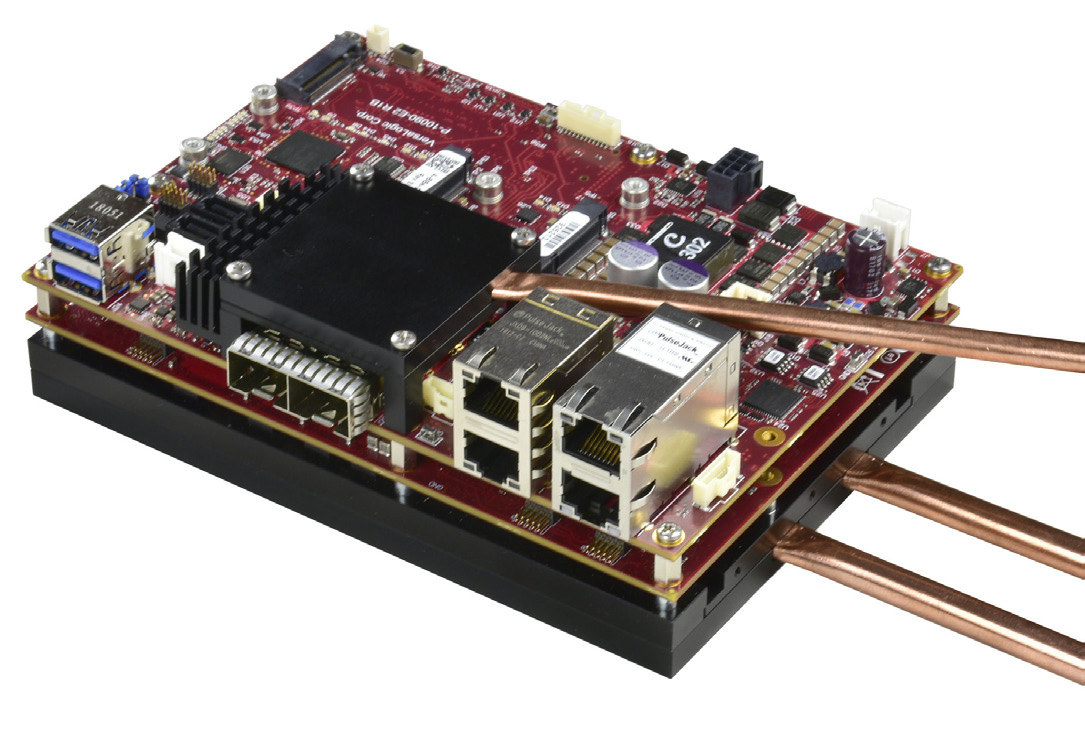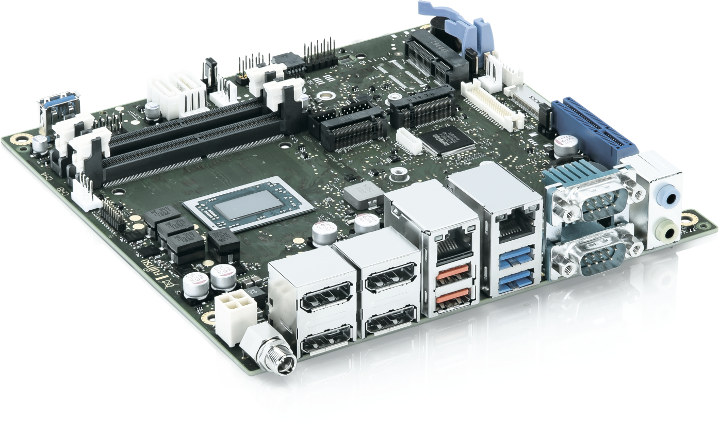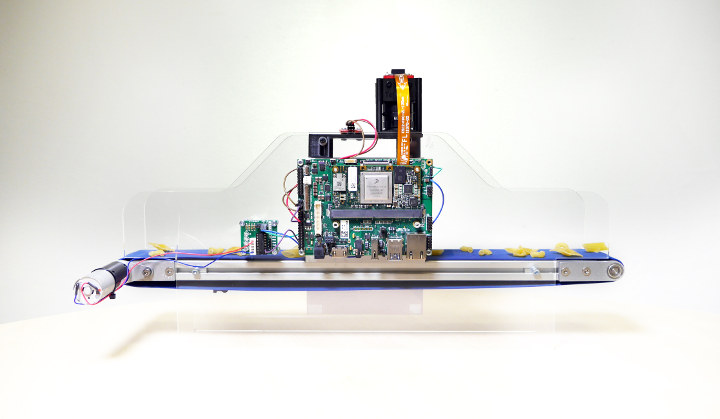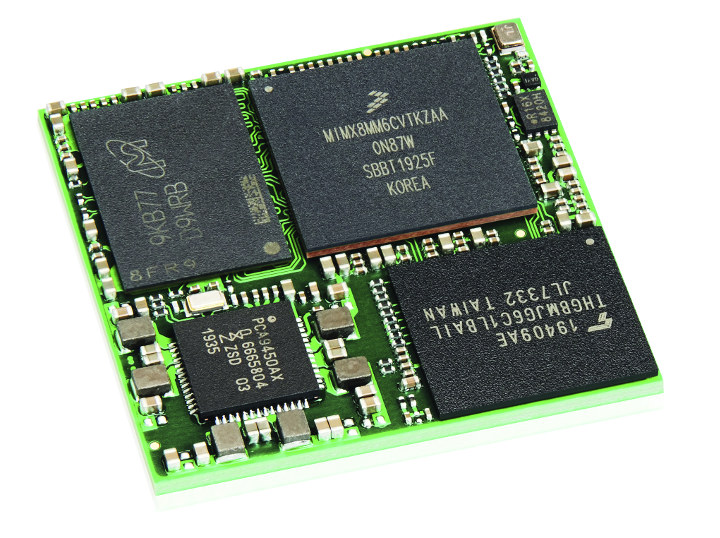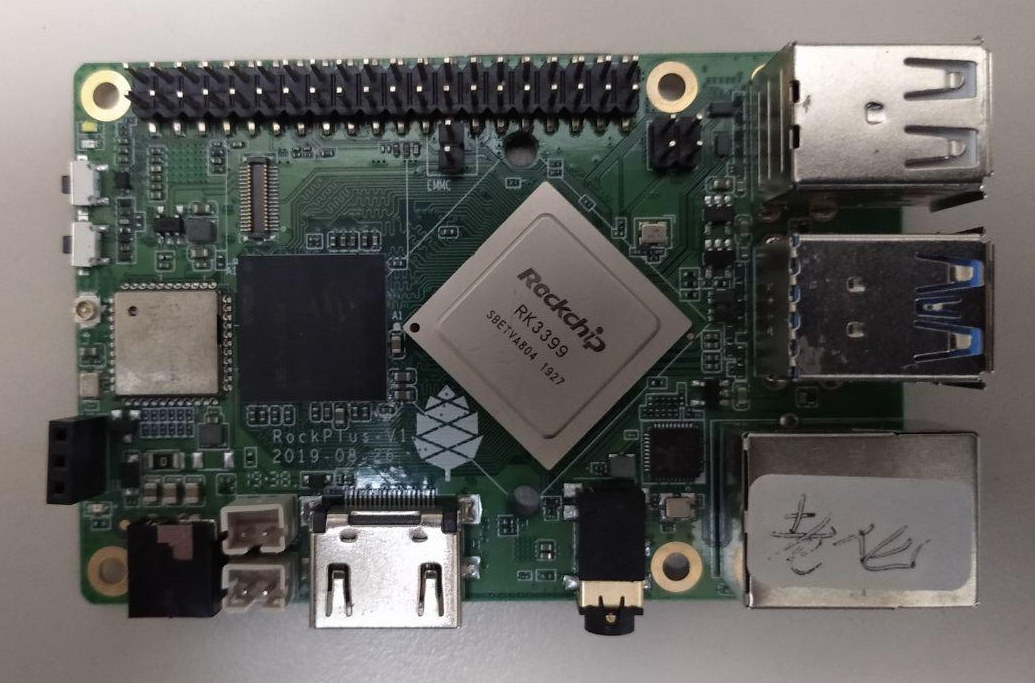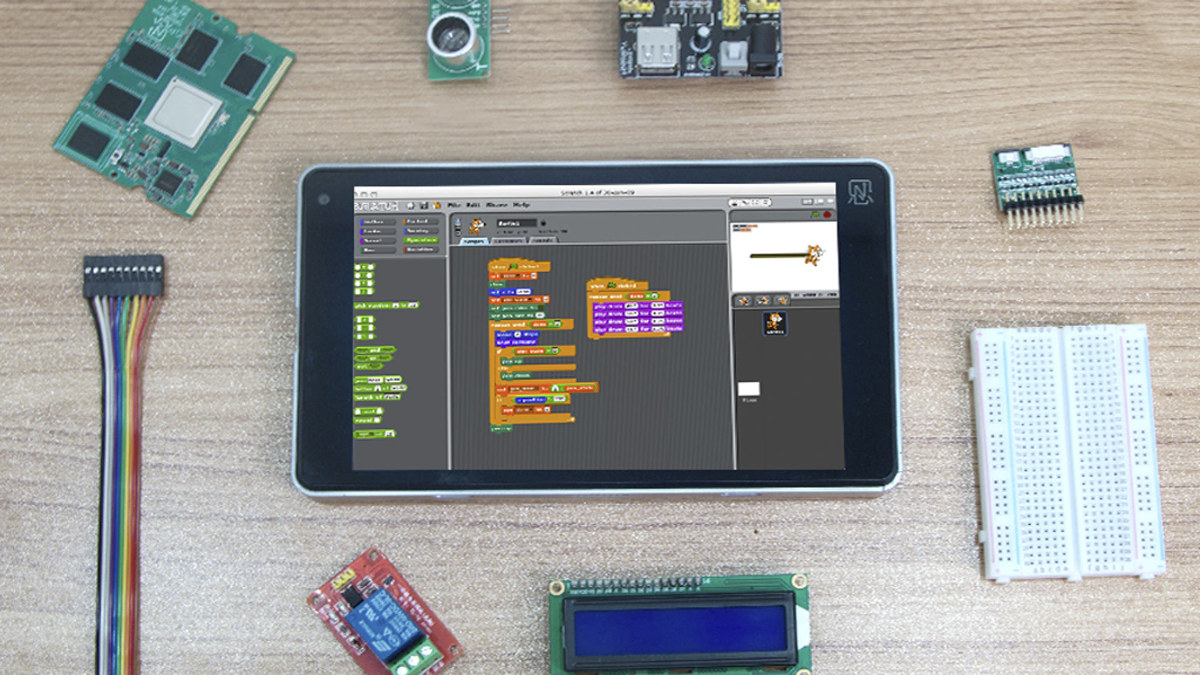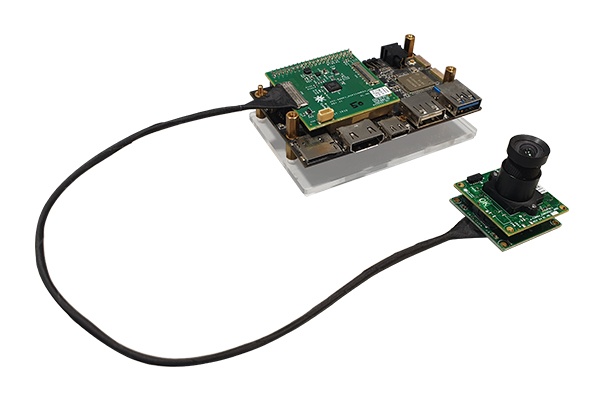Launched in 2016, Intel Atom Denverton processors are usually found in motherboards for low power servers hosted in data centers as well as in network appliances. But Versalogic Grizzly embedded server board fitted with the 16-core Atom C3958 Denverton processor aims specifically at embedded systems with applications ranging from smart-grid, and smart-city applications, to transportation, security, and defense operations. Versalogic Grizzly (VL-ESU-5070) key features and specifications: Processor – Intel C3958 16-core Denverton server-class processor @ 2.0 GHz System Memory – 4x SO-DIMM sockets for up to 128 GB DDR4 of ECC memory Storage – 2x SATA 3 ports, bootable mSATA socket, bootable M.2 NVMe SSD socket Networking – 2x 10GbE SFP+ ports (copper or fiber), 4x Gigabit Ethernet ports Video output – None, but optional VGA/LVDS mini PCIe card available Audio – No on-board audio, but optional VL-ADR-01 audio interface available USB – 2x USB 3.0 host ports Serial – […]
Kontron Launches AMD Ryzen Embedded Mini-ITX Board for Graphics Applications
We’ve seen several AMD Ryzen Embedded boards launched over the last couple of years, but the only one we covered here that happens to follow the mini-ITX form factor was iBASE MI988 motherboard powered by a choice of Ryzen Embedded V1000 processors. But there are others including Sapphire IPC-FP5V 10GbE embedded mini-ITX motherboard, and Kontron has just announced the D3713-V/R mITX motherboard with AMD Ryzen Embedded V1000/R1000 processor and aimed at “demanding graphics applications” such as kiosks, infotainment, digital signage, professional casino gaming systems, medical displays, as well as thin clients and industrial PCs. Kontron D3713-V/R mITX specifications: SoC (one or the other) AMD Ryzen Embedded V1202B dual-core/quad-thread Zen processor @ 2.3 GHz / 3.2 GHz (Boost frequency) with RADEON VEGA 3 graphics; 12W to 25W TDP AMD Ryzen Embedded V1605B quad-core/octa-thread Zen processor @ 2.0 GHz / 3.6 GHz (Boost frequency) with RADEON VEGA 8 graphics; 12W to 25W […]
Toradex AI Embedded Vision Starter Kit Leverages Amazon Web Services for AI and ML Applications
Toradex, Amazon Web Services (AWS), and NXP Semiconductors collaborated to create the AI Embedded Vision Starter Kit aiming to ease the development of cloud-connected computer vision and machine learning applications in industries such as industrial automation, agriculture, medical equipment, and many more. The AI Embedded Vision Starter Kit includes the following items: Toradex Apalis iMX8 System on Module (SoM) powered by NXP i.MX 8QuadMax applications processor Toradex Ixora Carrier Board Allied Vision Alvium 1500 industrial-grade MIPI CSI-2 camera All required cables and a 12VDC (30W) power supply Full software stack, including source code for running the device as well as for cloud deployment Extensive documentation 50 USD AWS credit The kit will help developers meet the must-have requirements of smart connected devices including secure connectivity, remote monitoring, OTA updates, maximum uptime & reliability, compact form factor, cost-optimized hardware, computer vision and machine learning algorithms optimized for low-power hardware, and more. […]
Kontron Launches the Smallest i.MX 8M Mini Module with 30x30mm Form Factor
Introduced in 2018, NXP i.MX 8M Mini is the first i.MX processor from the company manufactured with a 14nm process, and the low-power processor is found in several compact modules such as Variscite VAR-SOM-MX8M-MINI (38×28 mm), SolidRun i.MX 8M Mini SoM (47×30 mm), or Compulab UCM-iMX8M-Mini (38×28 mm). The smallest i.MX 8M Mini module we’ve covered so far is TechNexion XORE-IMX8M-Mini LGA system-on-module that takes just 30×30 mm of space. The TechNexion module is now joined by Kontron SoM SL i.MX8M Mini module with the same 30x30mm form factor, but a few more pins (267 vs 225). Kontron SoM SL i.MX8M Mini specifications: SoC – NXP i.MX 8M Mini quad-core Arm Cortex-A53 processor @ 1.6 GHz with one Arm Cortex-M4 real-time core @ 400 MHz, as well as 2D GPU and 3D GPU System Memory – 1GB LPDDR4 RAM (option up to 4GB) Storage – 8GB eMMC flash (option up […]
HardROCK64 SBC with Rockchip RK3399 Processor to Launch in April for $35 and Up
If you thought we didn’t have enough Rockchip RK3399 SBCs already, Pine64 is working on a smaller and cheaper version of the RockPro64 single board computer with HardROCK64 SBC powered by RK3399 processor and following Raspberry Pi form factor. HardROCK64 specifications: SoC – Rockchip RK3399 hexa-core processor with 2x Arm Cortex-A72 @ up to 1.8 GHz, 4x Cortex-A53 @ up to 1.4 GHz, a Mali-T864 GPU, and a VPU with 4K VP9 and 4K 10-bit H265/H264 decoding System Memory – 1GB, 2GB or 4GB LPDDR4 Storage – SPI flash, eMMC flash socket, MicroSD card slot Video Output – HDMI 2.0, AV port, MIPI DSI connector Audio – Analog stereo audio via AV port, digital audio via HDMI Camera – MIPI CSI connector Connectivity – Gigabit Ethernet, dual-band WiFi 5 (802.11ac) and Bluetooth 5.0 USB – 2x USB 3.0 ports, 2x USB 2.0 ports Expansion – 40-pin Raspberry Pi compatible header […]
Raspberry Pi 4 is Now OpenGL ES 3.1 Conformant, Work on Vulkan Drivers Started
Raspberry Pi 4 Model B 4 was launched last June with a new Broadcom BCM2711 SoC featuring an upgraded Videocore VI GPU supporting OpenGL ES 3.0 graphics API. Some drivers only implement a subset of OpenGL 3.0/3.1 3D graphics standard defined by the Khronos Group, and the good news is that Raspberry Pi 4 Model B is now OpenGL ES 3.1 conformant, as it passed all tests in Khronos conformance test suite. That means that any Linux programmed using OpenGL ES 3.1 API should work out of the box, although in some cases there may be issues/bugs that were not detected by the test suite. The Vulkan API is an evolution of OpenGL ES API that is meant to be more power-efficient as it better makes utilize of multi-core processors. The Raspberry Pi Foundation has also started working on Vulkan support for Raspberry Pi 4, and while the driver is […]
Ntablet Android & Linux Tablet Features a Replaceable RK3288 CPU Module, GPIO Board
Most tablets on the market either run Android or Windows, and while some have tried to launch Linux tablets, none of the products have really caught on, although the upcoming PINETAB might change that. Another option might be Ntablet 7″ tablet that runs either Android, Debian or WebOS Linux operating systems, but also offers some innovative features such as a replaceable Rockchip RK3288 CPU module, and an external GPIO board for makers. Ntablet hardware specifications: SoC – Rockchip RK3288 quad-core Cortex-A17 processor @ 1.8 GHz with Mali-T760 quad-core GPU System Memory – 2GB LPDDR3 Storage – 16GB eMMC flash, MicroSD card slot up to 32GB Display – 7″ touchscreen IPS display with 1920×1200 resolution Video Output – Micro HDMI port Audio – 3.5mm headphone jack Camera – 5MP front-facing camera (OV5648 sensor) Connectivity – 802.11b/g/n/ac WiFi 5 and Bluetooth 4.0 via Ampak AP6255 module USB – 1x USB 2.0 port, […]
96Boards compliant Rock960 Development Board Gets a 5.0MP MIPI CSI Camera
VAMRS Rock960 is a 96Boards compliant development board based on Rockchip RK3399 processor that was first unveiled in 2017, but last year it got a low-cost version with Rock960 model C selling for as little as $69. All variants of Rock960 come with MIPI CSI signals exposed via the 60-pin high-speed connector defined in 96boards specifications. So it needs a MIPI adapter board to connect the camera, and a couple of years ago, instructions were posted explaining how to use a MIPI CSI camera on 96boards such as Rock960. It now appears the MIPI adapter board is not for sale on eBay anymore, but that not an issue as e-Con Systems has just launched e-CAM50_CU96 5.0 MP camera designed to work with Rock960 board, and by extension, I assume, other 96boards compliant SBCs that expose a MIPI CSI interface. e-CAM50_CU96 is comprised of three main components: e-CAM55_CUMI0521_MOD camera module with […]

